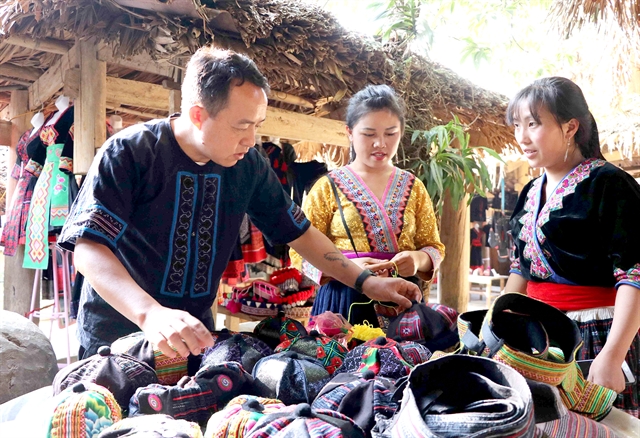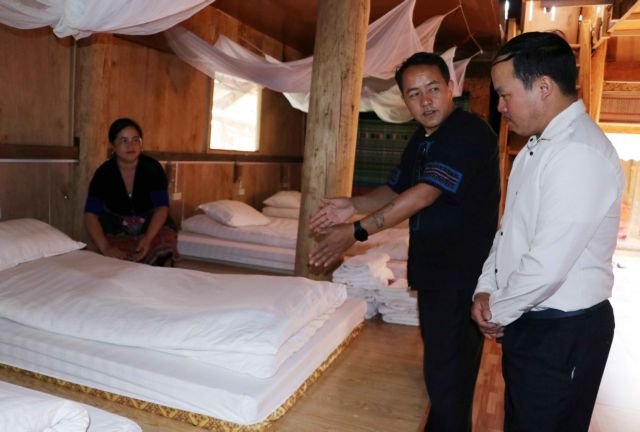 Society
Society

 |
| Paster Hảng A Xà talks with Mông ethnic women about tourism products at a fair in Sin Suối Hồ village, the northern province of Lai Châu. — VNA/VNS Photo |
LAI CHÂU — An evangelical Christian pastor in the northern mountainous province of Lai Châu has spent many years helping Mông people receive treatment for drug additions and develop their household economy.
He is Hảng A Xà, a Mông man, in Sin Suối Hồ village of Phong Thổ District, a 48-year-old pastor of the Northern Việt Nam Evangelical Church.
For years, he has encouraged family, relatives and followers to develop the economy and respect the guidelines and policies of the Party and State, which has contributed to maintaining security and order in the village and forming a united community of believers.
The village of Sin Suối Hồ has 148 households with more than 700 Mông people.
From a village of poor households where over 80 per cent of residents were drug addicts, after ten years, only 1 per cent are still drug addicts.
This result is due to the great contribution of pastor A Xà.
Born in a family of 12 brothers and sisters, he and his siblings had a rough childhood.
“Like many other families, we did not have enough rice to eat but opium was everywhere,” A Xà told the Tiền Phong (Vanguard) newspaper.
A Xà recalled that from 1995 onward, Sin Suối Hồ village was a poppy growing area so the number of addicts increased day by day, making the economy slowdown and 100 per cent of households were in poverty.
At that time, he was only 20 years old, but he was determined to help people get rid of drug addiction and develop production.
He, the village's Party secretary, the head of the village, elders and other non-addicts visited each household to persuade people to stop using opium.
First, they asked addicts and their families to destroy all smoking instruments, and then sent the addicts to camps in the uplands and the forest to get rid of opium addiction.
“Every day, these addicts received food and other supplies from their relatives or the village's volunteers to ensure their health,” said A Xà.
“Just like that, the old addicts helped the new. When they were clean and returned to the village, they always closely watched by volunteers so that there was no chance of relapse,” he said.
After ten years, from 1995 to 2005, the village basically abolished poppy growing and drug addiction.
Chang A Hảng is an example of successful detox.
In the past, A Hảng did nothing but spend all his family's money on opium. After getting successfully detoxed, A Hảng worked so hard that he earned enough money to build a house and pay tuition fees for his children.
A Hảng said: “I was addicted to opium starting in 1990. I was encouraged by A Xà and the village's authorities to move to the upland area for drug rehabilitation.”
“After five years, I successfully detoxed,” A Hảng said.
Since then, his health improved, and he opened a small grocery store.
Up to now, his family’s life has been stable and better.
Along with helping many villagers get rid of opium addiction, from 2005 to 2010, A Xà also mobilised the Mông people to change their habits and give up outdated customs in daily life and production.
He mobilised the villagers and the commune authorities to contribute to building a 5km-concrete road in the village.
Then, he talked about forest protection to make people aware of the environment and to stop deforestation as a traditional habit.
The villagers build chicken coops, pigsties and barns to raise livestock and poultry. Each household has its own garbage pit to ensure environmental hygiene.
Many villagers have focused on household economic development including planting orchids and growing cardamom.
Along with economic development, the ethnic people are also interested in preserving their cultural identity by establishing teams to perform in fairs.
 |
| Hảng A Xà visits a home-stay facility in Sin Suối Hồ village. — VNA/VNS Photo |
Sin Suối Hồ village has gradually formed a community tourism area that was granted a certificate by Lai Châu Province.
Notably, at the ASEAN Tourism Forum (ATF) in 2023 held in Indonesia, Sin Suối Hồ Community Tourism Site received the 3rd ASEAN Community Tourism Award.
From a poor Mông village, Sin Suối Hồ village has now become a typical community tourism village of Lai Châu Province.
In the village, 10 per cent of children go to universities and colleges and 10 per cent of households participate in tourism service.
Currently, each household earns a yearly income of VNĐ100-400 million (US$4,200-17,000).
All households are committed to implementing the "5 Nos": No addiction, No littering, No domestic violence, No social evils, and No third child.
A Xà said: “For Sin Suối Hồ village to attain these achievements, it had to go through five steps of detox, mindset changing, infrastructure development, human resource training and unique product making.”
“If you want people to believe, you have to be a pioneer. When the people have agreed, they will voluntarily follow,” the pastor said.
Deputy chairman of Phong Thổ Commune’s People’s Committee Mai Thị Hồng Sim said that A Xà is a good example with great influence on the Mông community.
“The pastor's creative approach to drug addiction treatment in the community is a ‘bright spot’ in Phong Thổ District as well as in Lai Châu Province,” Sim said.
“In particular, the pastor is a pioneer and has guided the ethnic people to do tourism, gradually building Sin Suối Hồ village to become a typical tourist destination of the province,” she added.
Pastor Hảng A Xà has received many certificates of merit for his contributions to the community. — VNS




